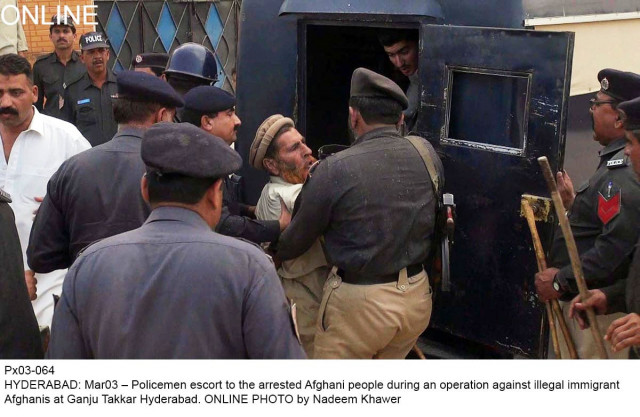‘Unwelcome’ guests: Illegal Afghan immigrants worry Sindh politicians
Speakers warn against targeting Pakhtun residents.

Hyderabad policemen escort an illegal Afghan refugee in Ganju Takkar on Monday. PHOTO: ONLINE
Even the Awami National Party (ANP), with its predominant Pakhtun base, backed the move along with Sindhi nationalist and mainstream parties. Nevertheless, a difference of opinion exists over the approach required to deal with the issue.
The Daily Sindh Express organised, on Monday, a discussion forum on ‘Settlement of Illegal Immigrants in Sindh and Threat of Terrorism’ to discuss the issue. The speakers included nationalist leaders, lawyers and representatives of the Muttahida Qaumi Movement (MQM) and the ANP. “When Pakistan was being formed, we were assured that it would be a country of Punjabi, Pakhtun, Sindhi and Baloch,” said Jeay Sindh Qaumi Mahaz vice-president Niaz Kalani. “However, soon after partition, the establishment flooded Sindh with Indians, Bengalis, Burmese, Afghans and interprovincial immigrants in order to control the province’s natural resources.”
He added that his party is boycotting all financial dealings with ‘non-Sindhi people’ in the province after their scheduled March 23 rally in Karachi.
“We will not sit in a rickshaw if the driver is not Sindhi, purchase anything from their shops or be involved in any sort of trade with them,” he proclaimed.
Qaumi Awami Tehreek president Advocate Ayaz Palijo emphasised that the Pakhtuns should be differentiated from Afghans and the Taliban. “Urdu speaking people should also be differentiated from the MQM and the Punjabis from the establishment,” he said.
Palijo also suggested that Pakhtuns should not be singled out as the province is home to a great number of immigrants from different origins. He proposed that district-level vigilance committees should be formed to identify illegal migrants and the neighbourhoods which house them. “We are not opposed to the registration or deportation of illegal Afghan immigrants but Pakhtuns should not be targeted in their name,” said ANP leader Khamus Gul Khattak.
He added that his party supports the ongoing operation in Karachi despite the fact that many of their workers have been killed in it.
MQM MPA Sabir Qaimkhani, who also stressed on distinguishing Pakhtuns from Afghans, cautioned against giving the provincial government move an ethnic colour. “Even in my constituency there are Pakhtun who often point out unknown Afghans and other immigrants taking shelter in their neighbourhood.”
Some of the participants then went on to suggest that people from other provinces settling in Sindh should also be registered and should be issued work permits. Former Sindh advocate general Yousuf Laghari said the Constitution allows freedom of movement within the country but allows for certain restrictions, as contained in Article 15.
The lawyer advised the Sindh government to legislate laws that curb interprovincial movement.
Published in The Express Tribune, March 4th, 2014.



















COMMENTS
Comments are moderated and generally will be posted if they are on-topic and not abusive.
For more information, please see our Comments FAQ